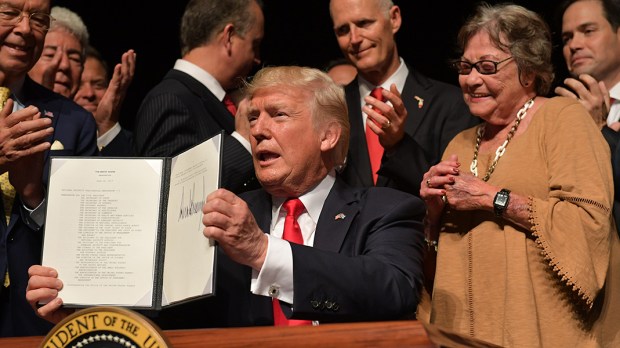President Donald J. Trump’s announcement Friday of a rollback in the United States’ opening to Cuba has revived a debate between those who believe engagement is the way to encourage Cuba to improve its human rights record and those who stick to an isolationist policy. To solve that impasse, a Cuban-American author who has been declared an “enemy of the state” in Havana believes that the world needs to look to the example of South Africa.
“The missing piece here is what’s been missing from every American president: to try to get the rest of the world to treat Cuba the same way the old South Africa was treated,” said Carlos Eire, author of Waiting for Snow in Havana, winner of the 2003 National Book Award. “When apartheid existed in South African, the whole world ganged up on South Africa. It was very unified, imposing sanctions. No American president has ever led other nations to do the same with Cuba.”
Trump, speaking to the Cuban exile community in Miami’s “Little Havana” district June 16, said he will reinstate travel and commercial restrictions eased by the Obama administration in an attempt to obtain additional concessions from the Cuban government.
The Human Rights Watch organization argued that reversing the Obama administration’s changes in United States policy toward Cuba will not improve respect for human rights on the island
“The previous administration was right to reject a policy that hurt ordinary Cubans and did nothing to advance human rights,” said Daniel Wilkinson, managing director for the Americas at Human Rights Watch in a statement. “The fact that Obama’s approach hasn’t led to political reform in Cuba after just a few years isn’t reason to return to a policy that proved a costly failure over many decades.”
Eire, a professor of history at Yale University, came to the United States in the early 1960s, when the Pedro Pan program brought thousands of children from the island to the US in the wake of the Cuban Revolution. He has been outspoken in his criticism of the Castro regime’s human rights abuses. All of his books are banned in Cuba.
Although he feels Trump’s new policy toward Cuba doesn’t go far enough, Eire acknowledges that it will help prevent tourist dollars and other revenue streams from aiding the Cuban military. He pointed out the the tourist industry in Cuba is operated by the military, which he accuses of shipping weapons to North Korea, among other things that are contrary to American interests.
“We do not want U.S. dollars to prop up a military monopoly that exploits and abuses the citizens of Cuba,” Trump said in Miami.
However, Trump’s directive will keep the embassies in Washington and Havana open, and an exception from the prohibition on transactions with military-controlled entities will protect cruises and direct flights between the United States and Cuba. In addition, Cuban-Americans will still be free to travel to the island and send remittances to relatives there.
Last year, such remittances came to about $3 billion. And Cubans who have come here over the past two decades with refugee status and are able to visit relatives in Cuba twice a year brought another $3 billion in goods, Eire said in an interview, arguing that that should be banned, or at least cut way back.
“I say if you say you’re here as a refugee, you’re a refugee,” he said. “Refugee means you’re afraid to go back to your country.”
But wouldn’t prohibiting remittances and the ability of Cuban refugees to carry goods back to their families hurt those Cuban residents, many of whom live in poverty?
“The government takes a cut of every remittance sent,” Eire responded. “And the $3 billion that go in, yes, it helps individuals to some extent, but it doesn’t change the economy in Cuba. … It keeps the country afloat, but it also keeps it poor because it doesn’t create jobs. What you have basically is the worst kind of non-incentive for change. I know it sounds cruel, not sending your family money or anything. I think it’s possible to cut back but not eliminate it completely, so your family can be helped.”
Eire pointed out that there are two kinds of stores in Cuba: “stores that the government has designated as fulfilling the need of the people with a ration book,” where the normal Cuban currency that people get paid in can be used, and stores where Cubans can spend remittances and where goods are much more expensive than they are in the US.
While the privileged can use the Cuban currency that is convertible with foreign currencies, all others have to turn in dollars and convertible pesos to the regime, which gives them in return only 20 percent of the value, explained Paul Bonicelli as director of programs at the Acton Institute, explained in an article at The Federalist website. “The Cuban family that got your dollars cannot use them because they have to turn them in to the government in exchange for a few lousy and worthless Cuban pesos,” Bonicelli wrote.
Since the normalization process began under the Obama Administration, allowing US tourists to visit the island, food that would go to the Cuban currency stores is being given to the tourists, making it harder for average Cubans to find enough to eat.
Asked whether greater engagement would help the human rights situation in Cuba, Eire contended that “there’s 20 years of proof that engagement does not work.”
“Since the fall of the Soviet Union, Europe and Canada have been engaging. Three million tourists a year, one million alone from Canada, has done nothing,” he said. “Engagement doesn’t work when you’ve got the equivalent of a Stalinist or Nazi or Maoist regime controlling the flow of information and not allowing people to improve their economic situation or political integration.”
“No one has ever been able to force the Castro regime to change its human rights policy,” Eire said. “Ever.”

